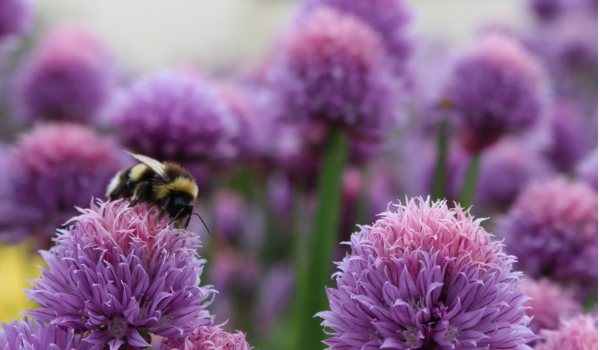Home » Bees at Airfield Estate

Bees at Airfield Estate
-
 A third of the world’s food production depends on pollinators like bees. Many important food crops just wouldn’t grow without them. Wild and ornamental plants depend on them too, as do the huge amount of animals that feed on the fruit and seeds of those plants. In Ireland, over half of our bee species have undergone substantial population declines since 1980. Declines like these are occurring worldwide, largely due to human activity. There are quite a few things we can do about this. May 20th is UN World Bee Day, declared in 2017 to raise celebrate the role of bees in food security, biodiversity, and sustainable agriculture. To mark this year, we’re sharing five things you can do today to support these helpful Hymenoptera!
A third of the world’s food production depends on pollinators like bees. Many important food crops just wouldn’t grow without them. Wild and ornamental plants depend on them too, as do the huge amount of animals that feed on the fruit and seeds of those plants. In Ireland, over half of our bee species have undergone substantial population declines since 1980. Declines like these are occurring worldwide, largely due to human activity. There are quite a few things we can do about this. May 20th is UN World Bee Day, declared in 2017 to raise celebrate the role of bees in food security, biodiversity, and sustainable agriculture. To mark this year, we’re sharing five things you can do today to support these helpful Hymenoptera!1) Grow bee-friendly plants
Plant pollinator-friendly plants, particularly species that bloom in autumn and spring, when nectar is in shorter supply. If you have the space, sowing a native wildflower patch in your garden is effective and looks lovely. Alternatively, leave a patch of lawn unmowed: dandelions, daisies, buttercups, and the other flowers that will take over are bee-favourites.2) Build a bee bath
Searching for nectar-rich flowers is thirsty work! A shallow dish or birdbath with a few small stones makes a perfect place for a bee to stop and recharge. Sugar-water solutions are often suggested as another way to nourish tired bees. These work as a last resort, but moving the bee to a nectar-rich flower nearby will be much better for it long term.3) Go chemical-free
Avoid using artificial garden herbicides and pesticides. These directly harm bees and their food sources. In Airfield, we are committed to organic, regenerative agriculture and using natural alternatives to harmful chemicals.4) Be a citizen scientist
Keep an eye on the National Biodiversity Data Centre’s website. They coordinate the All Ireland Pollinator Plan (of which Airfield was an early partner) and run several pollinator monitoring projects, such as Bumblebee monitoring and timed flower-insect counts. These can be done anywhere and are a great way to introduce kids to local nature! The data you collect will be used to inform and direct Ireland’s pollinator plan.5) Support local beekeepers
Beekeepers work hard to keep bee populations healthy. A well-trained keeper promotes bee-friendly habitats and practices that can indirectly support wild pollinators. Local honey also helps with seasonal allergies and reduces food miles. Local honey is available at the Airfield farmers' market and farm shop. You can also take part in a beekeeping workshop to learn about what it takes to keep bees, which takes place regularly at Airfield Estate. Check the upcoming events here.
